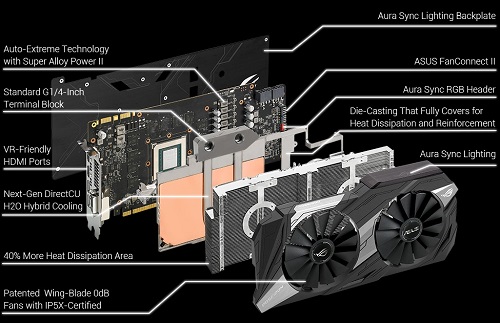- Republic of Gamers Forum
- GPUs & PSUs
- NVIDIA Graphics Cards
- Matrix 980 ti Asic score
- Subscribe to RSS Feed
- Mark Topic as New
- Mark Topic as Read
- Float this Topic for Current User
- Bookmark
- Subscribe
- Mute
- Printer Friendly Page
Matrix 980 ti Asic score
- Mark as New
- Bookmark
- Subscribe
- Mute
- Subscribe to RSS Feed
- Permalink
01-22-2016
09:42 AM
- last edited on
03-06-2024
03:00 AM
by
![]() ROGBot
ROGBot
This does not sound to great for one of the more expensive cards on the market. £650 And Asus "top" card other then there 20th edition.
- Labels:
-
GPUs
-
Graphics Cards
-
NVIDIA
- Mark as New
- Bookmark
- Subscribe
- Mute
- Subscribe to RSS Feed
- Permalink
01-24-2016 01:01 PM
- Mark as New
- Bookmark
- Subscribe
- Mute
- Subscribe to RSS Feed
- Permalink
01-24-2016 02:18 PM
But such card cost 1000$ and work on same speed as Matrix...cost so much only because higher ASIC.
That's weird because same company, EVGA only one year before that explain that ASIC is not important even if people get 50%.
Better invest similar money in Gold version, she work on higher clock and you don't care about ASIC.
And than you know you have fastest card ever build... If someone tell you my could work faster, you answer him
Go to hell ...and that's it. 🙂 They could only to push their cards if want same speed as Gold and much more people will fail to stabilize 980Ti on 270MHz over reference.
- Mark as New
- Bookmark
- Subscribe
- Mute
- Subscribe to RSS Feed
- Permalink
01-24-2016 02:28 PM
- Mark as New
- Bookmark
- Subscribe
- Mute
- Subscribe to RSS Feed
- Permalink
01-24-2016 09:28 PM
the f34r channel wrote:
all good and well but how do i find out the asic of my card for example? I must add that i am not a believer, like you also said.
gpu-z.
- Mark as New
- Bookmark
- Subscribe
- Mute
- Subscribe to RSS Feed
- Permalink
01-24-2016 10:12 PM
- Mark as New
- Bookmark
- Subscribe
- Mute
- Subscribe to RSS Feed
- Permalink
01-25-2016 11:32 AM
- Mark as New
- Bookmark
- Subscribe
- Mute
- Subscribe to RSS Feed
- Permalink
01-25-2016 04:56 PM
The F34R Channel wrote:
Found it, it's not really obvious to find in the first place. Anyway, 60.1%.
Understandable. The average user wouldn't know or care about ASIC score. lol
- Mark as New
- Bookmark
- Subscribe
- Mute
- Subscribe to RSS Feed
- Permalink
01-25-2016 09:11 PM
- Mark as New
- Bookmark
- Subscribe
- Mute
- Subscribe to RSS Feed
- Permalink
01-26-2016 11:11 AM
The silicon fab process cannot deposit linear circuit pathways and component nodes onto the substrate with absolute precision, every single chip has many physical/electrical flaws when examined at the molecular level. Low ASIC quality means statistically higher incidence of electrical leakage at critical junctions, this means the (GPU) ASIC chip as a whole requires more power and produces more heat, it often also means the chip cannot sustain stable operation of faster clocks or it can only do so while ramping up power consumption (and heat output) along a steeper exponential curve. High ASIC quality is desirable for hard overclocking because the parts will tend to run stable at faster clocks while consuming less power and spewing less heat.
The GPUs are manufactured only by AMD or NVIDIA (and both employ the same TSMC fab plant), they are tested only to ensure that all circuit blocks and functions are operational at AMD/NVIDIA "reference" performance levels - nonfunctional parts are destroyed (or carefully analyzed to increase future process yields), partially-functional parts are binned as lesser GPUs with the bad circuit components deactivated (sometimes not even electrically connected, though more often a reference "fully connected" chip package with the bad circuitry locked out in firmware). GPU card makers (Asus, EVGA, MSI, Gigabyte, etc) then buy batch quantities of these GPUs and re-bin them internally, they use those with lower ASIC quality on their reference-clocked cards, they set aside those with higher ASIC qualities for their factory-overclocked offerings. All this testing and binning and retesting and rebinning is expensive and time-consuming, and it takes them a while to hoard enough "perfect" chips to produce their most elite fastest-overclocked cards in volume.
GPU-Z does have a software ASIC Quality test, it's probably based on extensive tabulated comparisons of measured electrical efficiency under an array of differing conditions, but the exact parameters and implementation are largely a mystery. This test could, in fact, be wildly inaccurate and based on very arbitary measures - AMD, NVIDIA, TSMC, and all the GPU card manufacturers don't volunteer detailed technical information which could be used to give competitors (and investors) any kind of edge. But the GPU-Z test is at least a useful rough indicator, it is useful for comparing your ASIC Qualities with other people (online) who use the same testing metrics, and it certainly "sets the bench" where no other benchmark exists.
The GPU in your Matrix GTX980Ti has been binned and rebinned with a lot of precision (because a lot of money is involved), so it likely has an ASIC quality which is consistent with all other Matrix GTX980Ti cards. And better than Asus reference GTX980Ti cards. And worse than faster-clocked EVGA GTX980Ti cards. But there are individual variances within each batch of parts, it's always possible that yours is a little better than than the norm, it's also always possible yours is a little worse (though less likely, since it has to promise a minimum performance level to command a premium price). Compare your ASIC quality with those reported by GTX980Ti users on the techPowerUp GPU database.
[/Korth]


